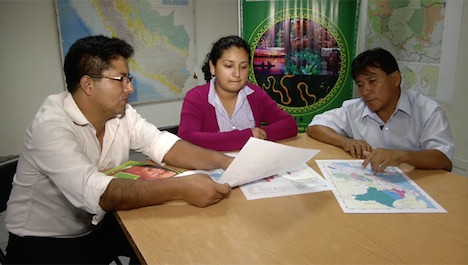|

|
Peruvian rights Ombudsman calls out Gov't on Indigenous rights
 Print This Print This
By Staff Writers, teleSUR
teleSUR
Wednesday, May 27, 2015
 |
| Members of Indigenous Rights Coalition Discussing 'Prior Consultation' | Photo: teleSUR / Rael Mora
|
Peru’s Ombudsman criticized the government of President Ollanta Humala on Tuesday for failing to enforce legislation that protects indigenous people.
Known as the 2011 Prior Consultation Law and Agreement 169 of the International Labor Organization, this law gives indigenous communities the right to voice their opinions on developments related to the land they have inhabited for centuries.
Also known as the ‘People’s Defender’, the Peruvian Ombudsman is a state institution, independent of political parties and branches of government. Its responsibilities include overseeing the protection of human rights for all citizens and ensuring they receive state services as outlined in the constitution.
According to the Prior Consultation Law and Agreement 169 of the ILO, the Peruvian government is obliged to negotiate with indigenous communities prior to permitting development projects in their territories. However, the Ombudsman claims the government has only consulted indigenous communities on 10 project proposals – a small fraction of ongoing projects – and has failed to meet any of the demands that resulted.
Sedequias Ancón Chávez, National Director of the Inter-Ethnic Association of Development of the Peruvian Amazon (AIDESEP), blames authorities for the current situation. According to him, officials “are not making their employees follow through [with the laws]. They are not collecting information as they should."
The Ombudsman also stated that the situation is worse with mining projects in the Andes, where a great number of Quechua indigenous people have been denied their right to prior consultation by the government.
Daniel Sánchez is in charge of Indigenous Rights at the Office of the Ombudsman. According to him, "we have two official sources – the ministry of Culture and the INEI [the government statistical agency] – telling us that there is an indigenous presence there [in the Andes]. For that reason, the right to prior consultation should apply.”
Reports from the INEI conclude that 90 percent of the people from the areas in question are Quechua speaking. Speaking such an indigenous language is one of the key criteria indicated by the International Labor Organization to determine whether or not a person is indigenous. However, Sánchez concludes that “the Ministry of Energy and Mining is suggesting that this information is not enough and instead approved an incomplete study from a consulting agency as valid."
The study referred to by Sánchez is one used by the government to approve projects without including research on the native language spoken by the locals.
Over 20 years have passed since Peru ratified Agreement 169, but indigenous communities have yet to see advances. The situation is likely to continue causing clashes in a country that already has 175 active social conflicts, with most of them resulting from disputes with extractive industries.
Source URL
|
 Print This Print This

|
If you appreciated this article, please consider making a donation to Axis of Logic.
We do not use commercial advertising or corporate funding. We depend solely upon you,
the reader, to continue providing quality news and opinion on world affairs. Donate here
|
 |
Featured

|

